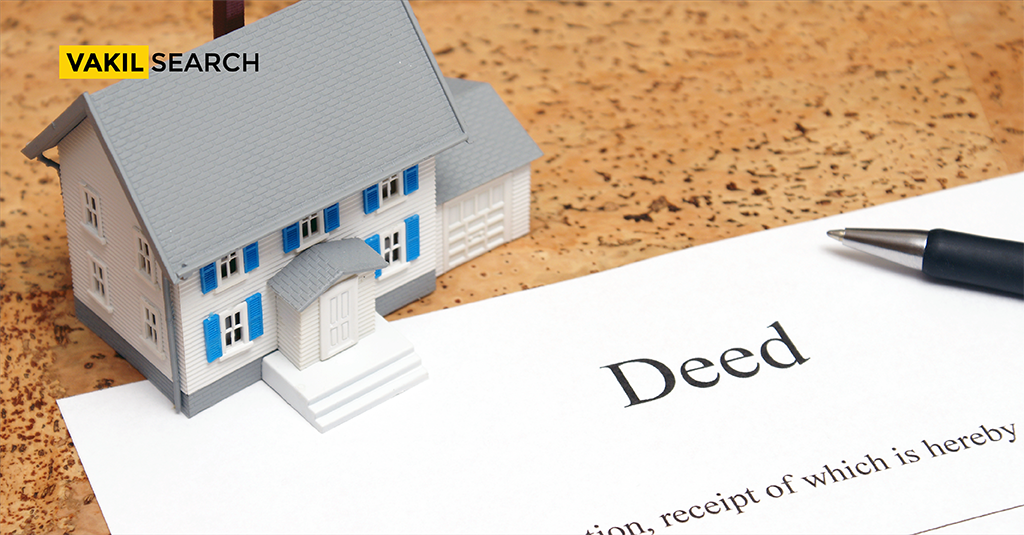A sales deed initiates the communication between a property buyer and an interested seller in India. This article is an exclusive source of knowledge regarding key features of sale deeds in India
A sales deed represents a vital legal document which comes into play when a buyer purchases a property. This document simply implies that the entitlement is transferred from the owner to the one who has paid for it. A sales deed initiates the communication between a property buyer and an interested seller in India. This article is an exclusive source of knowledge regarding key features of sale deeds in India
The sales deed in india shows the property specifications and establishes the rights and legal obligations involving both parties. Judicial stamp paper is not required to draft a sales deed. The Indian Registration Act of 1908 regulates the policies stipulated by a sales deed. The involved individuals are addressed as vendor and vendee respectively.
This legal act indicates a change in previous ownership status. 1988’s Transfer of Property law includes a clause in Section 54 which indicates that the provisions are applicable only for immovable properties. In the next section, we are about to read the salient clauses present in a sale deed.
Features of Sale Deed in India
Now we are going to know all the important points that must be a part of any valid sales deed issued in India. These clauses are as follows:
- Identity of individuals participating in the transfer of properties: The document must show the personal details of both parties. These pieces of information sum up the name, residential address, current age, etc. All the details must match the official documents of the persons involved.
- Specifications of the property to be transferred: This field is a must. A detailed description of the concerned property has to be mentioned on the paper. For example, suppose you are selling a 3 BHK apartment, then it is your responsibility to highlight minute details like cumulative plot area, landmark of the flat, ID number, etc.
- Sales agreement: The norms and regulations that are going to control the course of property transfer are set by both parties before drafting the sales deed. In this stage, the seller demands an advance payment from the buyer which he needs to provide to lock the deal.
- Sales negotiation: The consideration clause of the sales deed shows the agreed-upon amount which has to be charged from the buyer before transferring property rights. The amount or price must be expressed both in words as well as figures.
- Mode of payment: This is a crucial factor; legal intervention is not required for this as parties mutually decide in the deed whether they are going to complete the payment process via net banking, cash, demand draft or some other means. The total amount again has to be stated without fail.
- Advance payment: A Property sale has got to generate a token amount which is furnished by the prospective owner in order to close a particular offer. The partial payment ensures a form of reservation by the name of the interested person who agrees to pay the remaining sum of money later.
This policy or system is being mandated to imply the clauses of a sales deed to a buyer. The paperwork must reciprocate the money which has been already transferred to the bank account of the owner. Also, the seller should issue an invoice supporting the transaction and give it to the buyer.
Instalment schemes are also accepted while collecting the advance payment on which the seller can charge interest. These policies need to be fixed first in the Sales agreement.
- The clause stating the transfer of title: This section proclaims the identity of the new property owner. The buyer shall enjoy all benefits associated with the property rights once the transaction has been completed following the clauses of the sales agreement.
- Sales Deed’s Delivery: The buyer must possess both the sales agreement as well as the sales deed once he attains the projected property’ possession. The seller must provide the original documents to the person making the purchase.
- Indemnity clause: This portion explains that the sold property is free from any possible charges such as water bills, electricity invoices, etc. If the buyer discovers that the aforesaid case is not true then he/she has the right to indemnify the seller based on this clause of the sales deed.
- Defaulter’s Liability: This clause states that if any one of the individuals commits faulty activities, he/she will be liable to pay compensation to the other party. This must be ensured to maintain the stability of the cell.
- Registration in presence of witnesses: Once the sales deed has been completed, the buyer and seller get hold of two witnesses who approve of providing testimony. This action must take place within 120 days from the issuance of the sales deed. The regulations have been set up by the Registration law (1908).
- Property clause ensuring the right of quiet enjoyment: This clause restricts a third party force or the previous owner from interfering in the life of the buyer once the property rights have been duly shifted.
- Reddendum: The seller adds this clause to mention a few limited rights which he/she will continue to have on their previously owned property.
- Tandem clause: This portion ensures that the buyer will inherit all the associated advancements made in the property as they happen to be a part of the deal closed between both parties.
- Warranty: The most vital portion of the sales deed expresses that the buyer is from now onwards the lawful landlord of the property.
- Time is the essence – sales deed clause: This expresses that one party’s active contribution within a predetermined time is required. Failing to perform activities abiding by this clause positively ends the commencement of the contract. Document delivery, termination sequence, closing date, etc. are mentioned in this segment. Deadlines direct the course of sales.
- Fundamental Right to nullify a deed: This specifies typical situations that if encountered, either of the parties can discontinue their adherence to the sales agreement. This drastic decision usually comes into play when the seller refrains from handing over the house or at times when the buyer disagrees to pay the agreed-upon amount.
Miscellaneous Provisions
Some additional features are there in the Sale deed in India. These might be the Governmental norms, confidentiality regarding the personal details of the seller, contract breaching conditions, etc.
Also, this might include legal notice that specifies the channel of communication between the involved parties. Apart from all of these amendment possibilities are also stated to provide flexibility to the sales agreement. All this information must be thoroughly read and legal assistance must be taken before proceeding to buy a property in India.
Conclusion
Two parties mutually decide on the terms of a sales agreement whenever property rights are to be shifted from one person to another. The sales deed is then drafted and it comes with multiple clauses. Vakilsearch has summed up the key features of sales deeds in this article to guide you in your prospective endeavors.
Read More :










